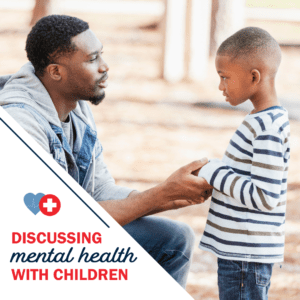 A Guide to Discussing Mental Health with Children of All Ages
A Guide to Discussing Mental Health with Children of All Ages
Over the past few decades, it has become widely accepted that mental health is just as important to our overall well-being as physical health. However, stigmas and misinformation still exist about mental illness. To combat this, parents and caregivers should openly discuss mental health with kids of all ages. Our experts have gathered tips and information to make those conversations easier.
Establish your own basic understanding
To provide the most accurate information when discussing mental health, you need to understand it yourself. Be prepared to honestly and concretely answer any questions that come up. The more knowledge you have about the topic, the more comfortable you will feel having the conversation. Even young kids can pick up on uncomfortable body language and tone, so the more relaxed you are, the more at ease they will feel.
There is an abundance of resources available for parents and caregivers to educate themselves such as:
- American Academy of Child & Adolescent Psychiatry
- National Federation of Families for Children’s Mental Health
- National Mental Health Association
You can also ask one of the providers at Midwest Express Clinics for more information and other resources to gain a better understanding of mental health.
Continually open the door to sharing
Trust is an essential component of having difficult conversations with kids. Before jumping into a discussion specifically about mental health or illness, consider working on establishing trust with your child through chats aimed at getting them to feel comfortable opening up. You may find that mental health comes up naturally in these exchanges.
Here are some prompts to help you get conversations started:
- What is something you think you are really good at?
- What makes you a good friend?
- What do you want to be when you grow up?
- Tell me about your favorite book/movie/show and why you like it.
- What are three things you are thankful for?
- What do you like most about yourself?
- What’s something you want to get better at?
- What three words would you use to describe yourself?
- What makes you feel happy/sad/angry/worried?
- If you had a magic wand and could make the perfect life, what would it look like?
Normalize talking about mental health
Children are likely to model the behaviors they see from parents, caregivers and other adults. By sharing your feelings and letting them see your emotions when appropriate, it normalizes expressing and exploring the way they feel, an essential aspect of maintaining a healthy mental state. Talk about when you feel sad, worried or frustrated and how you cope with those feelings. Be transparent if you take medication for a mental illness or you meet with a therapist. This transparency will help children feel comfortable coming to you and show them you will understand if they experience similar symptoms.
Keep it age appropriate
The needs of children and their ability to understand information are different depending on their stage of life. The things they respond and relate to will differ from child to child as well. Keep an open mind and try different tactics in your conversations about mental health.
Preschool-age children
Very young kids need things to be simple. Limit the information and details you provide about mental health. Use basic words to describe emotions such as sad, mad and happy. This age group tends to focus on what they can see, so teach them to identify emotions through pictures. Help them learn simple coping mechanisms like deep breathing and going to a calm space when they need to process emotions.
School-age children
This age group often expresses their curiosity for the world around them through questions. Answer them directly, honestly and in a way that encourages them to ask more. If you’re struggling to come up with an answer on the spot, tell them it’s a good question and you’ll need to research it first. In addition to calming breaths and walking away, you can also have kids in this age group try counting and repeating mantras as coping mechanisms.
Teenagers
Teens tend to respond well to open dialogue that includes give and take. If a conversation feels one-sided or like a lecture, they may shut down. Be prepared for specific and difficult questions when discussing mental health with teens. It’s important to dispel any stereotypes and correct misinformation they might have received from peers. Some teens find it difficult to open up to their parents, so consider enlisting the help of another close, trusted adult to have these conversations.
One common tactic that can work with children is to compare mental illness to a physical ailment. For example, people often get sick with a cold or flu, but they’re usually able to participate in their normal activities. However, if someone develops a serious illness like pneumonia, they will need to take medicine and go to the hospital. Similarly, feeling sad, angry, worried or irritable happens to everyone at some point. But if these feelings last a long time or make school, work and relationships hard, they may need more intensive treatment.
Signs additional help is needed
If you notice your child is struggling with mental health, you may need to seek professional help for them. Consult with a healthcare provider if they exhibit any of these behaviors:
- Feelings of deep sadness or being withdrawn for more than two weeks
- Experiencing sudden overwhelming feelings of fear for no reason, sometimes accompanied by a racing heart or fast breathing
- Getting in frequent physical altercations or wanting to hurt others
- Having intense worries or fears that get in the way of daily activities
- Showing drastic changes in behavior
- Severe mood swings that cause problems in relationships
If you are worried about your child’s mental health, don’t hesitate to reach out for professional help. The providers at Midwest Express Clinic can discuss your concerns and recommend next steps or direct you to other resources and appropriate mental health professionals in your area. Check in online to be seen today.




